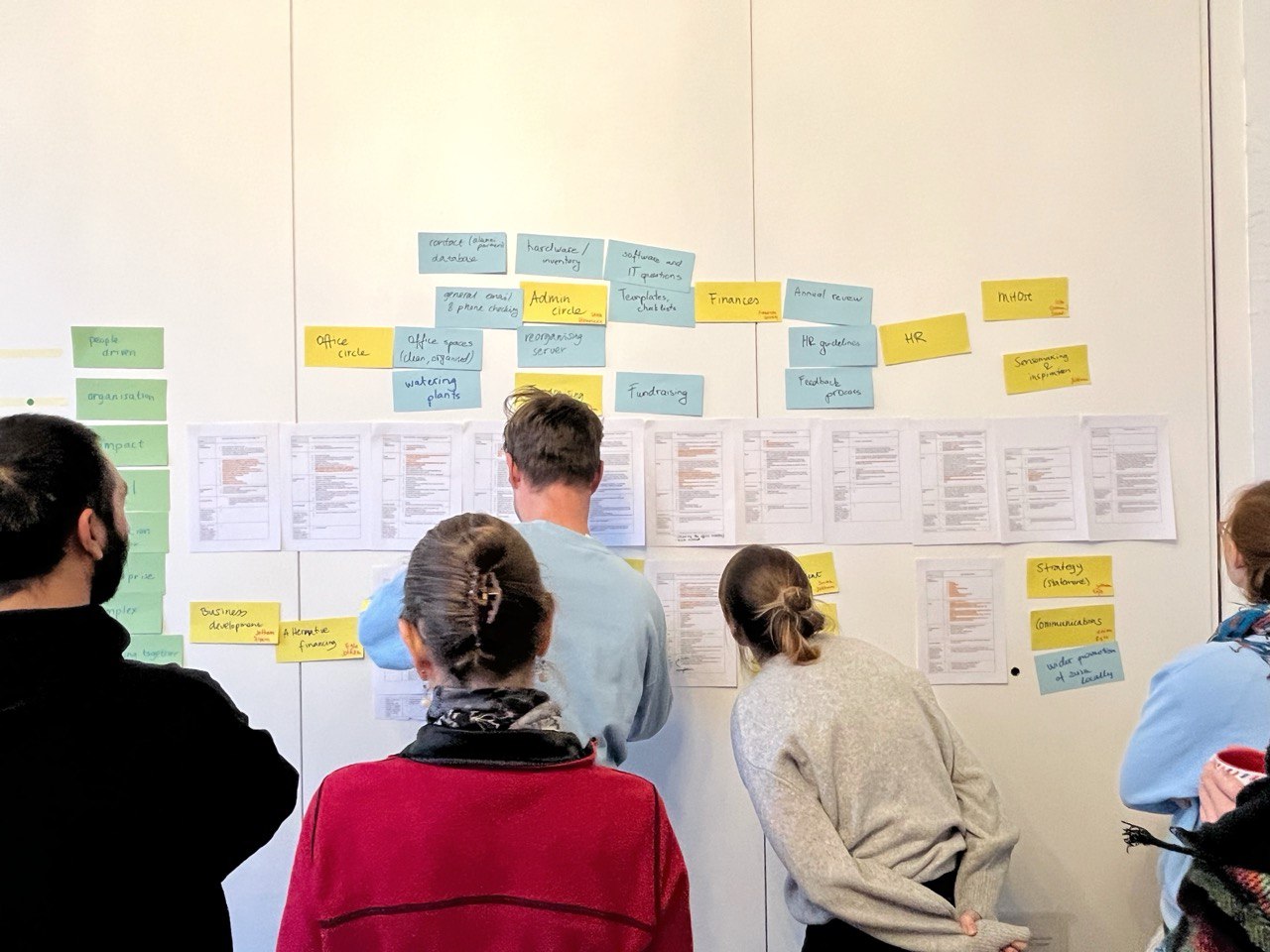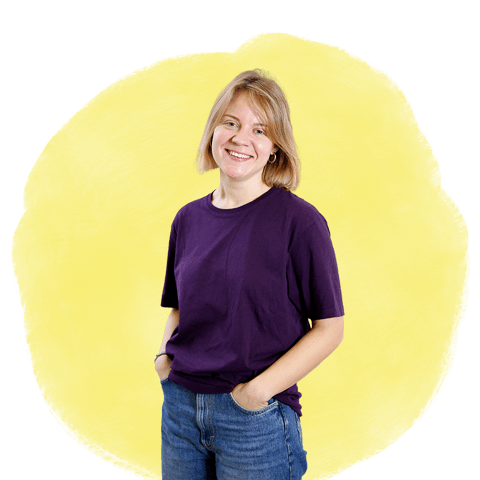strategy is a verb
In an effort to become more mission-driven and collectively advance our organisation’s purpose, the zusa team came together for a retreat in November 2023. A team survey held shortly before the retreat showed that the team is quite aligned around zusa’s purpose (the WHY) but more exchange was needed about specific directions (the WHAT) and moreover: each of our roles and responsibilities required more clarity (the HOW).
We had worked with an organisational diagnostic tool called interdependent pairs before and to understand the current landscape and potential tensions of zusa’s strategy, we deployed a bunch of our organisational yings and yangs. We asked each team member where they see we stand now and where they think we should be moving to. With some of the strategic pairs, it was clear the team wanted to shift the balance from e.g. currently more project-driven to more organisational strategy work in the near future. The pairs that were less clear or controversial were then explored deeper in smaller groups. The below overview gives an impression of the considerations in these groups and the conclusions we draw from them. These directions we now call zusa’s compass. Happy navigating!

interdependent pairs summary
purpose-driven < > people-driven
Earlier this year some of our team members had a chance to learn more about horizontal management and working in teams from a social designer Samantha Slade. One of her fundamental beliefs is that purpose is the invisible leader of any organisation, and we as employees need to serve it, first and foremost. Even though we at zusa strike quite a good balance between attending to our purpose and being driven by our team, there seems to be a shared intention to minimise the dependency on specific people and remind ourselves more often that we are here to care for purpose of organisation.
project < > organisation
At the time of typing this blog post, we have 12 projects being run by our team, that consists of 14 people. That’s quite a lot for such a small team, isn’t it? Thus, it is no surprise that the current balance in this scale leans more towards a “project” side. However, our organisational structure is closely attached not only to projects that we implement but also to organisational tasks and different topics of interest. We as a team organise ourselves in circles and work together on points of sustainability, safer spaces, the team hosting, and similar. It seems that in the near future we want to have more of that!
non-profit < > social enterprise
At our work, we value people as much as we value impact. People are impact. Back in 2021 we decided to change our legal status and became a social enterprise to gain more agility, and, eventually, be able to create more impact. We also had to admit to ourselves that the pie for NGOs working in our field is getting smaller and smaller, and possibilities to secure core funding are not in sight anymore. The idea of being a social enterprise gave us some new energy, but also it requires a stronger structural and mental shift and makes it slow motion in finding a “golden middle.
international < > local
The first thing we say when we talk about zusa is that we are an international organisation. It is so enshrined in our identity that it’s hard to imagine it being anything different. However, recently we noticed that we got engaged in local projects and contexts more often. In VAHA programme, for example, we support mostly local collaborations, similarly other programmes are designed to have strong local elements. Moreover, thanks to our AiR zusa residency programme and several other local initiatives, we started to be more rooted in Berlin context, be more aware what’s happening in our yard, so to speak. It seems that today we should call ourselves “internationally local”, as we continue balancing both directions.


co-creation < > invitation
Since day one, our guiding star has been the principle of do-it-together. We strive for co-creation and whenever possible choose to develop programmes together with our partners. However, we noticed that highly co-creative processes can be exhausting and time-consuming. Nowadays, when the capacity and time resources of many of our colleagues and partners are limited, we recognise a need to also work with a principle of “invitation” – favouring framework over uncertainty, clear roles and responsibilities over an ambiguous setting. Nevertheless, we remain loyal to our guiding star and when possible, dive into a process of co-creation!
simple < > complex
The fundamental pillar of zusa and a base for many of our current activities is the Tandem programme. We feel strongly connected to its values and even more so to its ever-growing community. Programmes like VAHA and All-Around Culture are scale-ups of previous Tandem Turkey and Tandem Shaml editions. Since we felt comfortable in Tandem shoes for quite a while, we wanted to test deeper and bigger waters and took a deep dive into complexity. After almost 5 years of experimenting with manifold frameworks, we feel a need to switch the gears and take more simple steps, yet we understand that we are “simply complex”. This is a clear agreement among the team, which makes this interdependent pair quite outstanding!
Euro+ MENA < > global
Our geographical focus is Europe and its neighbouring regions. Recently our clear focus areas have been Ukraine, Turkey and a wider MENA region, where our alumni network of over 1000 people spans. Today, we have a shared understanding that we want to keep this focus, especially as the powers of division are fragmenting societies and communities in these areas even further. However, we remain open to opportunities on a global scale, too. Do you want to do something together in Mexico? Hit us up!
under radar < > political
As an organisation working with and for civil society, we are political by default. Our engagement in territories where many crises emerge shows our care and deep interest in making a change in different social and cultural contexts. In the last couple of years, the wars of destruction rage on in Palestine, Ukraine; the freedom of speech has been under attack in Turkey and many other places – we simply cannot afford to stay silent. However, recently we faced some challenges of listening through difference, we felt that it was a good time to bring this interdependent pair for a group calibration. For now, it seems that we want to stay in the middle of this scale yet continue standing our ground and cause in often highly political matters.
stay on the course < > crisis response
Following the previous pair, this one reaffirmed our shared wish to find a golden middle and relative balance in this very unbalanced world. In the last years, some of our programmes were designed as direct responses to crises (i.e. Culture Helps), and it seems that there is little hope for the world to slow down in this sense. However, without staying on the course we cannot respond to those crises in a healthy way. Similarly, to the previous paragraph, we agree that while staying on the course, we will not stay quiet because we don’t want to lose track, that is clear.
programming < > (re)granting
The focus within our team is shifting more towards programming in the future, while recently we saw a tendency to do regranting quite often. We see regranting and programming as interconnected – while regranting is crucial, especially in non-EU geographies, we hold it dear to our hearts to implement programmes on the ground, have a hands-on approach and want to get people together. Our team agrees that zusa’s mission and strength lie in programming and providing much-needed and missed spaces for people to gather and interact.
horizontal < > vertical
Finally, we asked ourselves once again – how do we feel about going horizontal? The whole story of zusa is marked with our shared intentions to be more horizontal, as we took this inspiration from Teal organisations models in our foundation days. Currently, we feel quite alright at where we at, managing our mostly horizontal structure that has some strong vertical elements, too. We see zusa as an organisation where each person is at their full potential, no matter their role, and where we meet at the eye-level. However, we acknowledge that going horizontal is a journey, not a destination, and that we are in this together.
conclusions
We covered a lot of ground in our strategic deliberations, and rather than setting this in stone, we feel it’s the conversations in the team and the directions we agree on, that make up the compass that will help us navigate next developments and decisions.
Overall, we feel that we’re on a good way to become more mission-driven and share strategic work amongst colleagues. We know we have a few conversations coming up around working interlocally, horizontally and navigating complexity. And we’ll be checking in on our interdependent pairs in 1-2 years, to finetune again.
If you want to know more about our process or care for advice on your own strategic work, don’t hesitate to reach out. We are happy to advise, facilitate your strategy process, or simply chat about various tools and formats to be used. You can reach us at hello@zusaculture.org


